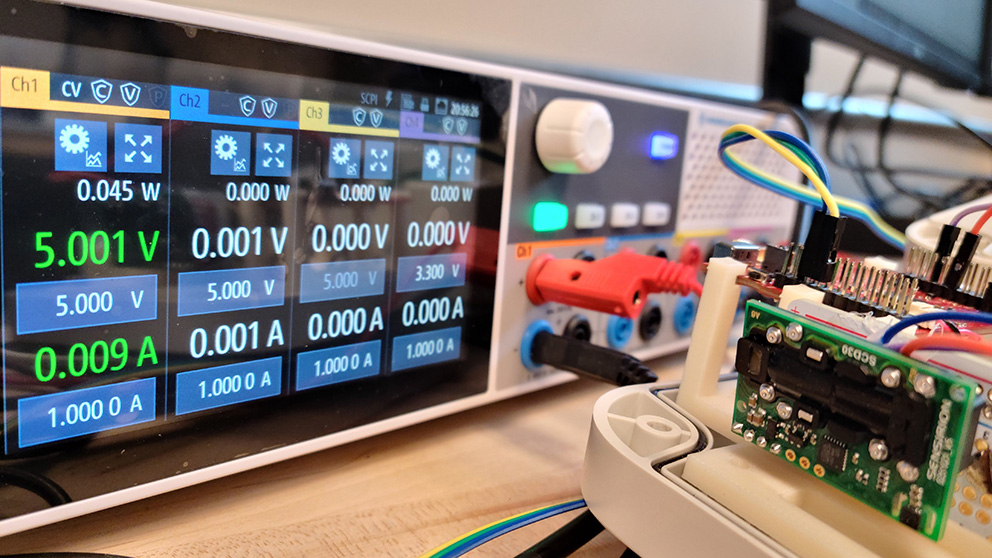Embedded Systems Design

Program Highlights
The widescale adoption of connected devices and wireless sensing has created new trends in the job market. Today, companies increasingly need employees skilled in hands-on mechatronics and microcontroller programming. Fleming College’s Embedded Systems Design micro-credential series will train you in the key skills needed for the integration of electronic, mechanical, and computing systems in everyday work.
Each micro-credential in this series will cover one or more of the fundamental skills required for embedded systems design. By completing the full micro-credential series you will have the technical know-how to be competitive for entry-level positions within the fields of mechatronics, embedded systems design, and the Internet of Things.
Course Delivery
Each of these online courses is delivered asynchronously. Each course can therefore be completed at your own pace and on your own schedule, with submission of the final applied project within a 2-month window.
Admission Requirements
The minimum admission requirement for entrance into this program is: 19 years of age or older, or an Ontario Secondary School Diploma or its equivalent.
Additional Costs
There is an additional cost of approximately $60 to $190 for specific instructional supplies for the applied project. Some supplies can be reused for multiple courses. Details will be sent by email upon registration.
Credential
Micro-Credential.
You will receive a digital badge after completing each of the courses in this series, and a Statement of Achievement upon completion of the entire series.
Courses in Embedded Systems Design
Details and registration below
Embedded Systems Design - Required
- Embedded Systems Design 1-Firmware Development for Microcontrollers (COMP661)
- Embedded Systems Design 2-Sensor Integration, Motor Control (COMP662)
- Embedded Systems Design 3-Position and Orientation Control (COMP663)
- Embedded Systems Design 4-Feedback Control System (COMP664)
Embedded Systems Design - Required
Embedded Systems Design 1-Firmware Development for Microcontrollers
COMP661
Designed for anyone with limited computer programming knowledge, this course will help you uncover the fundamentals of Microcontrollers firmware development using C language. We will delve into essentials of C programming, including variable types, if statements, loops, timers, interrupt routines, debugging etc. You will need the PIC32MM USB Curiosity Board, as course exercises to support learning will use this board and MPLAB IDE software for programming PIC micro controllers.
Choose a course date
Embedded Systems Design 2-Sensor Integration, Motor Control
COMP662
Through theory and hands-on experience you will discover how to integrate sensors with microcontroller systems and control DC motors. We will delve into digital and analogue digital and analogue sensors, serial communication protocols, and H-bridge motor controller. As part of the material requirements for this course, students will need equipment to support the use of the Curiosity Board, and will need to refer to the list of materials provided to them by email and purchase them as soon as possible before their course begins.
Choose a course date
Embedded Systems Design 3-Position and Orientation Control
COMP663
BLearn to program a tricycle robot. Discover how to control the position and orientation control of your robot and build skills in designing and implementing linear and rotational acceleration measurement, shaft encoders, and DC motor speed control. As part of the material requirements for this course, students will need equipment to support the use of the Curiosity Board, and will need to refer to the list of materials provided to them by email and purchase them as soon as possible before their course begins.
Choose a course date
Embedded Systems Design 4-Feedback Control System
COMP664
Develop your understanding of feedback control systems by learning about feedback control structure, system transfer function, proportional- integral-derivative (PID) controller and system design. Implement your knowledge of the previous micro-credentials of this series to design a controller system for a tri-cycle path finding robot. Completion of this micro-credential will prepare you for entry-level jobs in the field of mechatronics.
Choose a course date
Continuing Education
- Browse all Continuing Education courses
- Continuing Education at Fleming
- Registration and Student Information
- Course Cancellation, Withdrawal and Refund Policy
- Transfer Credit Request Form
- Grades, Tax Receipts and Address Verification
- Online Learning
- Academic and Career Entrance Courses
- Certificates and Specializations
- Certificate Audit Request
- Contract Training
Course Materials
Some courses require additional textbooks and/or materials. Please visit your campus store in-person or online:
Contact Us
Continuing Education & Corporate Training Office